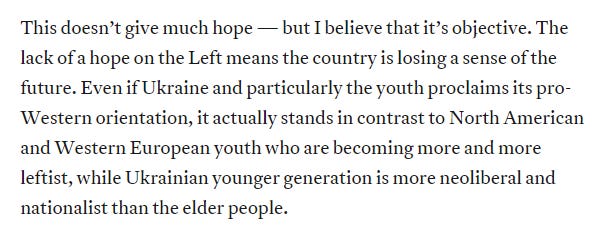repression, recession, depression
jacobin magazine on january 27, 2019 published a curious interview with kyiv-based sociologist volodymyr ishchenko, titled ukraine on the…
it’s always worth noting how people who never lived under socialism adore it while everyone who lived under it hates it.
jacobin magazine on january 27, 2019 published a curious interview with kyiv-based sociologist volodymyr ishchenko, titled ukraine on the brink.
i like the artwork on the cover.
editors of the magazine, which positions itself as “the voice of the american left,” subtitled the piece, “ukraine’s politics are dominated by oligarchs. its streets are more and more run by the far right.”
the 408-word introduction to the piece is a rehash of ukraine’s 27-year history, from 1991 to present.
there’s a lot wrong with it.
[…] in neighboring russia, the chaos and relative openness of the 1990s was giving way to putin’s new authoritarian order as political freedom was traded for a measure of stability.
it gradually became clear that there would be no such consolidation in ukraine. in december 2000, a series of recordings was leaked in which president kuchma discussed abducting the journalist georgi gongadze, as well as concealing the proceeds of corruption. the resulting protests were suppressed, and kuchma remained in place, but the groundwork had been laid for much larger demonstrations — the so-called “orange revolution” — that came four years later after vote-rigging by kuchma’s would-be successor, viktor yanukovych, in the 2004 presidential election. A rerun of that contest handed power to western-leaning viktor yushchenko, whose tenure combined some economic growth with rising inequality — and spanned the 2008 financial crisis, which further impoverished ordinary ukrainians. In the next election, in 2010, yushchenko lost to the opportunistic yanukovych.
the dates and names in this part of the preface are mostly incorrect.
putin didn’t become russian president until 2000, a year after a guard in ukraine’s presidential administration began surreptitiously recording conversations in president kuchma’s office. snippets of those chit chats were released in november 2000, more than two months after gongadze disappeared in kyiv. and it was yulia tymoshenko — not viktor yushchenko — who lost to viktor yanukovych in ukraine’s 2010 presidential election.
and so on.
i pointed out the most glaring mistakes to the magazine’s editors joe plommer, david broder and vololdymyr ishchenko on social media.
they told me there were no factual errors and, even if there are, it is because they only had limited space to explain what happened between the two rounds of the 2010 ukrainian presidential election.
ishchenko’s views about the left and the right in ukraine are what i found most interesting.
the battle between social-oriented, socialist economists on the left and libertarian economists on the right about economic reforms has been fought in the west for at least a century. in ukraine, they are still fighting.
my comments on ivshchenko’s (left) musings:
according to ivshchenko, left-oriented political groups in ukraine are forced to hold meetings secretly because of violent radical nationalists. this is false.
the sociologist tells jacobin russia’s unprovoked attack on ukrainian naval force vessels in international waters is not as bad as president petro poroshenko’s reaction to it. this is absurd.
i know many ukrainian leftists. sometimes, i think my 17-year daughter is one of them.
i would argue, as has imf group ukraine, that left-oriented socialist advice has sandbagged ukraine’s economy. taxes should be lowered and the moratorium on land sales lifted.








